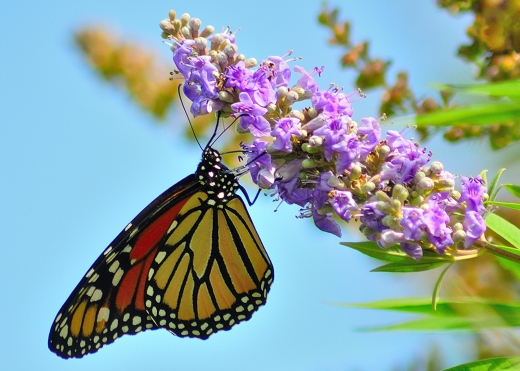Monarch project celebrated at Cultural Center
CONTRIBUTED BY Tom Bailey, Media Relations.
This article appeared in the March 2017 edition of the Chickasaw Times
SULPHUR, Okla. – Monarch butterfly experts plan a full day of educational and informational delights March 14 at the Chickasaw Cultural Center in Sulphur.
March 14 is “National Butterfly Day.” It occurs during the Chickasaw Nation’s annual “Three Sisters Celebration,” which runs March 13-18. The Three Sisters – corn, squash and beans – were traditionally planted together, each sustaining the other. The plants were used for centuries by Chickasaws to nourish tribal members and were stored in preparation of winter.
The Chickasaw Nation has dedicated itself to preserving the monarch butterfly. The beautiful creature’s population numbers have declined dramatically in the last 20 years. Special activities include:
-
10 a.m. – 5 p.m. Butterfly booth/exhibit will be set up with several giveaways and make-and-take crafts by the butterfly garden, located just outside of the tribe’s traditional village on the Cultural Center campus.
-
10 a.m. – 5 p.m. “Pollination Games on the Plaza” (education outreach to learn about butterflies) to be in the plaza in front of Chikasha Poya Exhibit Hall.
-
2 p.m. - Anoli Theater – Lecture, “The Monarch Butterfly and Its Amazing Journey!” by Thalia Miller and Rhonda Sellers.
-
1 p.m. and 3 p.m. – Anoli Theater – Film, “Flight of the Butterflies.”
The Chickasaw Nation is responding to what has been described by experts as an emergency. America’s monarch butterfly, a favorite of North Americans, is starving and disappearing, according to U.S. Department of Agriculture experts, who say unless U.S. citizens act now, monarchs may not exist beyond 2020.
More than 90 percent of North America’s native grassland was once covered with milkweed and other nectar plants, a perfect butterfly ecosystem. Now, a large portion of these grasslands have been converted into agricultural use or building development. In addition, insect-killing pesticides claim thousands of butterflies annually. New grasslands with milkweeds and nectar plants need to be cultivated immediately, USDA agriculturalists say, if these creatures are to survive.
The Chickasaw Nation has responded by planting milkweed and nectar plants throughout its 13-county territory in Oklahoma, particularly at Cultural Center.
The 184-acre campus, which lies a few miles east of Interstate 35, is in the monarch migration flyway through Oklahoma. The butterfly journeys from Mexico to Canada each spring and reverses the trip each autumn. Monarchs must lay their eggs on milkweed plants because their offspring emerge as caterpillars and feed on milkweed leaves. The caterpillars then spin themselves into cocoons and come out a few weeks later as brilliant orange, black and white butterflies.
Chickasaw Nation horticulture director Thalia Miller oversaw the planting of milkweed, fruit trees and nectar-producing plants at the Cultural Center.
“While the milkweed plant is very important, the nectar plants are also,” Ms. Miller said. “As soon as the butterflies emerge from their chrysalis and have feasted on milkweed leaves, they begin hunting for nectar. For that reason, we have filled our garden with plants that produce large amounts of nectar, such as Coreopsis, Solidago, Monardo and Echinacea.”
Ms. Miller and her team planted two large gardens at the Cultural Center, in addition to milkweed plots and nectar-rich feeding grounds throughout the nation’s boundaries.
“The key is to stagger plantings so blooms occur at different times in spring, summer and fall,” Chickasaw Nation ecological resource coordinator Rhonda Sellers said. “By doing this, plants will be blooming in the garden at all times.”
The tribe has also constructed a “hoop” greenhouse near the Cultural Center’s traditional village that offers a controlled enclosure for growing plants year-round. There is even a way for monarchs to enter and depart the structure safely.
The Cultural Center sponsors a monarch butterfly day each spring and autumn, featuring hands-on educational activities for teaching monarch-saving actions, special guest speakers and fun-filled learning experiences.
The Chickasaw Nation and other Oklahoma tribes have partnered with Monarch Watch, a University of Kansas program that coordinates species-rescuing efforts.
Chip Taylor, a former University of Kansas professor who leads Monarch Watch, said, “The tribes are ideal partners who strongly value respect for the land. No other place in the country offers this type of opportunity in dealing with large landowners.”